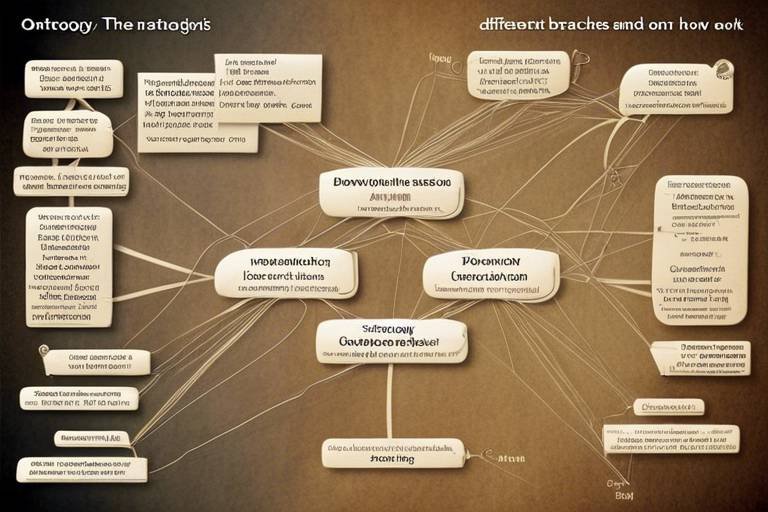How Ontology Shapes Our Reality
Ontology is not just a dry academic term; it’s a profound concept that shapes how we perceive our world and existence. Imagine walking into a room filled with vibrant colors, sounds, and textures. Each element you experience is part of a larger reality that ontology seeks to define. At its core, ontology is the philosophical study of being and existence, delving into questions like "What is there?" and "What does it mean to exist?" This exploration is crucial not only in philosophy but also in various other disciplines, influencing our understanding of everything from science to artificial intelligence.
When we dive into ontology, we find ourselves navigating a landscape filled with intricate ideas and frameworks. It’s like peeling an onion; each layer reveals deeper insights into the nature of reality. For instance, in philosophy, ontology helps us grapple with concepts of identity, time, and space. In science, it provides a structure for categorizing knowledge and understanding the complexities of the universe. This article will take you on a journey through the multifaceted world of ontology, revealing its historical roots, its significance in various fields, and its practical applications today.
As we explore ontology, we’ll uncover how it shapes our perceptions and interactions with the world around us. From the ancient philosophers who laid the groundwork for ontological inquiry to modern thinkers who challenge and expand upon these ideas, ontology has a rich history that continues to evolve. We’ll also examine its role in contemporary fields such as artificial intelligence and information science, where it enhances our ability to organize and process vast amounts of data.
Ultimately, understanding ontology is crucial for anyone seeking to comprehend the deeper layers of reality. It’s not just about academic knowledge; it’s about making sense of our existence and the world we inhabit. So, buckle up as we embark on this enlightening exploration of ontology and discover how it shapes our reality in ways we may not even realize.
- What is ontology? Ontology is the philosophical study of being and existence, focusing on questions about what entities exist and how they can be categorized.
- How does ontology influence philosophy? Ontology provides a framework for philosophical inquiry, helping to explore fundamental questions about reality, identity, and existence.
- Can ontology be applied in science? Yes, ontology plays a crucial role in scientific fields by informing the classification and organization of knowledge.
- What are some applications of ontology in technology? Ontological principles are applied in artificial intelligence and information science to improve data representation, retrieval, and user interaction.

Understanding Ontology
Ontology is a fascinating branch of philosophy that delves into the very essence of being and existence. Imagine standing at the edge of a vast ocean, where every wave represents a different aspect of reality. Just as the ocean is deep and mysterious, so too is the realm of ontology, which seeks to answer fundamental questions about what exists, the nature of those existences, and how they relate to one another. The term itself originates from the Greek words "ontos," meaning being, and "logos," meaning study or discourse. Thus, ontology can be understood as the study of being.
The significance of ontology extends beyond the confines of philosophy; it permeates various disciplines such as science, linguistics, and artificial intelligence. By establishing a framework for categorizing entities and their relationships, ontology provides a foundation for understanding complex systems. For instance, in biology, ontological classifications help scientists categorize living organisms and their interactions within ecosystems. Similarly, in computer science, ontologies play a crucial role in knowledge representation, allowing machines to process and understand information more effectively.
To grasp ontology fully, one must consider its implications in both abstract and practical contexts. On an abstract level, ontology prompts us to ponder questions like: What does it mean to exist? Are there different kinds of existence? Can we categorize things based on their essence? These inquiries challenge our perceptions and compel us to think critically about the nature of reality itself. On a practical level, ontological frameworks help organize knowledge, making it easier for us to navigate the complexities of information in our daily lives.
In essence, ontology serves as a bridge between the abstract and the concrete, enabling us to comprehend the world around us. It encourages us to explore our assumptions about existence and to consider how our understanding shapes our interactions with reality. As we delve deeper into the various dimensions of ontology, we will uncover its profound influence on our perception of existence and the ways it enriches our understanding of the universe.
As we move forward in this exploration, it's important to recognize that ontology is not just an academic exercise; it has real-world applications that impact technology, science, and even our social structures. By understanding the principles of ontology, we can better appreciate the interconnectedness of different fields and how they inform one another. In the following sections, we will examine the role of ontology in philosophy and science, revealing how this ancient inquiry continues to shape our modern worldview.

Ontology in Philosophy
Philosophical ontology delves deep into the fundamental nature of reality and existence. It's like peeling back the layers of an onion, revealing the intricate structures that underpin our understanding of what it means to "be." At its core, ontology questions not just what exists, but also how existence is categorized and understood. This exploration is crucial because it shapes our worldview, influencing everything from science to ethics and even our daily interactions.
Throughout history, many influential thinkers have contributed to the field of ontology, each adding their unique perspective to this complex tapestry. For example, René Descartes famously posited, "I think, therefore I am," which emphasizes the connection between thought and existence. This idea sparked debates about the nature of reality, consciousness, and the self. Similarly, Immanuel Kant introduced the distinction between phenomena (the world as we perceive it) and noumena (the world as it is in itself), suggesting that our understanding of reality is filtered through our senses and cognitive frameworks.
In modern philosophy, ontological discussions have evolved to include various schools of thought, such as existentialism and phenomenology. Existentialists like Jean-Paul Sartre argue that existence precedes essence, meaning that individuals create their own meaning and identity through their choices and actions. On the other hand, phenomenologists like Edmund Husserl focus on the structures of experience and consciousness, emphasizing how our perceptions shape our understanding of reality.
To illustrate the diversity of ontological thought, consider the following table that summarizes key philosophical perspectives:
| Philosopher | Key Idea | Contribution to Ontology |
|---|---|---|
| Plato | The Theory of Forms | Proposed that non-material abstract forms represent the most accurate reality. |
| Aristotle | Substance Theory | Introduced the idea of substances as fundamental entities in reality. |
| Descartes | Cogito, ergo sum | Linked existence to the act of thinking, emphasizing consciousness. |
| Kant | Phenomena vs. Noumena | Distinguished between the world as we perceive it and the world as it is. |
| Sartre | Existence precedes essence | Argued that individuals define their own meaning and essence. |
These philosophical debates are not just academic; they have real-world implications. For instance, how we understand existence affects our ethical frameworks and informs our approach to issues like artificial intelligence and bioethics. As we grapple with the advancements in technology and science, the ontological questions become even more pressing, compelling us to reconsider what it means to exist in a world where the lines between the real and the virtual are increasingly blurred.
In summary, ontology in philosophy serves as a vital lens through which we examine our understanding of reality. It challenges us to confront the very foundations of our beliefs and perceptions, urging us to question not only what exists but also how we relate to that existence. As we continue to explore these profound questions, we unlock deeper insights into ourselves and the world around us.
- What is ontology? Ontology is the philosophical study of being and existence, exploring the nature of reality and how entities are categorized.
- Who are some key figures in ontological philosophy? Influential thinkers include Plato, Aristotle, Descartes, Kant, and Sartre, each contributing unique perspectives to the field.
- How does ontology relate to other disciplines? Ontology influences various fields, such as science, ethics, and artificial intelligence, shaping our understanding of knowledge and existence.

Historical Perspectives
When we dive into the of ontology, we find ourselves on a fascinating journey through time, exploring how our understanding of existence has evolved. From the early musings of ancient philosophers to the complex frameworks of modern thinkers, ontology has undergone significant transformations. Imagine walking through a gallery of ideas, where each philosopher is like a painting that captures a unique viewpoint on reality.
In ancient times, philosophers such as Plato and Aristotle laid the foundational stones of ontological thought. Plato, with his Theory of Forms, suggested that the tangible world is merely a shadow of a higher reality composed of perfect forms. This idea implies that what we perceive is just a fraction of what truly exists. On the other hand, Aristotle took a more empirical approach, arguing that reality is grounded in substance and the characteristics of things. His concept of substance as the essence of being became a cornerstone for later ontological discussions. To illustrate their contrasting views, consider the following table:
| Philosopher | Key Idea | Impact on Ontology |
|---|---|---|
| Plato | Theory of Forms | Introduced the notion of ideal forms beyond physical reality. |
| Aristotle | Substance and Essence | Focused on the empirical study of beings and their properties. |
As we transition into the Middle Ages, ontology continued to evolve with the influence of religious thought. Philosophers like Thomas Aquinas integrated Aristotelian principles with Christian theology, arguing that the existence of God is the ultimate cause of all being. This blend of faith and reason opened new avenues for ontological inquiry, emphasizing the importance of divine existence in understanding reality.
Fast forward to the Renaissance and the Enlightenment periods, where thinkers such as René Descartes and Immanuel Kant began to question the nature of existence itself. Descartes famously declared, "I think, therefore I am," suggesting that the act of thinking is proof of one's existence. Kant, on the other hand, introduced a critical perspective, arguing that our understanding of reality is shaped by our perceptions and cognitive faculties. This shift from objective reality to subjective experience marked a pivotal moment in the history of ontology.
In the modern era, the existentialists like Jean-Paul Sartre and Martin Heidegger challenged traditional ontological views by emphasizing individual existence and the human experience. Sartre's idea that "existence precedes essence" posits that individuals create their own meaning in a seemingly indifferent universe. Heidegger, meanwhile, explored the concept of being itself, prompting us to ask what it means to be. This introspective approach has had a lasting impact on contemporary philosophy, leading to rich discussions about the nature of existence.
In summary, the historical perspectives of ontology reveal a tapestry of ideas that have shaped our understanding of reality. From the ancient Greeks to modern existentialists, each thinker has contributed to the ongoing dialogue about what it means to exist. As we continue to explore these perspectives, we uncover not just the evolution of thought but also the profound implications these ideas have for our daily lives and our understanding of the universe.
- What is ontology? Ontology is the philosophical study of being and existence, exploring the nature of reality and the classification of entities.
- Who are some key figures in the history of ontology? Important figures include Plato, Aristotle, Thomas Aquinas, René Descartes, Immanuel Kant, Jean-Paul Sartre, and Martin Heidegger.
- How does ontology relate to other fields? Ontology influences various disciplines, including philosophy, science, artificial intelligence, and information science, shaping our understanding of knowledge and existence.

Ancient Philosophers
When we dive into the rich tapestry of ancient philosophy, we find ourselves standing on the shoulders of giants like Plato and Aristotle. These thinkers didn't just ponder existence; they laid the very foundations of ontological inquiry that continue to resonate through the ages. Imagine a world where questions about reality and being were just beginning to be explored—this was the playground of ancient philosophers.
Plato, in his quest for truth, introduced the idea of Forms, suggesting that beyond our tangible world lies a realm of perfect, abstract entities. For him, understanding reality meant grasping these Forms, which represented the essence of all things. Think of it as trying to catch a glimpse of the ideal version of a chair, not just the one you sit on. Through dialogues, particularly in works like "The Republic," he argued that knowledge is not merely about sensory experience but about intellectual insight into these eternal truths.
On the other hand, Aristotle, a student of Plato, took a different route. He shifted the focus from the abstract to the concrete, emphasizing empirical observation. His ontology was grounded in the idea that everything has a purpose, or telos, and that understanding the essence of a thing requires examining its nature and function. Imagine a tree: to truly understand it, one must consider its biology, its role in the ecosystem, and even its symbolic meanings in various cultures. Aristotle's works, such as "Metaphysics," provide a systematic approach to categorizing existence, which laid the groundwork for future ontological debates.
Both philosophers contributed significantly to the discourse on existence, but their approaches sparked a fascinating divergence in thought. While Plato's idealism sought to transcend the physical world, Aristotle's realism anchored philosophy in observable reality. This tension between the ideal and the real is still a pivotal point of discussion in contemporary ontology.
In summary, the contributions of ancient philosophers like Plato and Aristotle form the bedrock of ontological exploration. Their ideas challenge us to consider not just what exists, but the very nature of existence itself. As we navigate through the labyrinth of philosophical inquiry, we find their insights illuminating our path, reminding us that the quest for understanding is as ancient as thought itself.
- What is ontology? Ontology is the philosophical study of being and existence, exploring what entities exist and how they can be categorized.
- Who were the key ancient philosophers in ontology? The key figures include Plato and Aristotle, whose ideas laid the groundwork for future ontological discussions.
- How does Plato's theory of Forms relate to ontology? Plato's theory suggests that beyond our physical world, there exists a realm of ideal Forms that represent the true essence of things.
- What did Aristotle contribute to ontological thought? Aristotle emphasized empirical observation and the idea that everything has a purpose, which helped shape a more realistic approach to understanding existence.

Modern Developments
In the realm of ontology, the modern era has ushered in a wave of innovative theories and frameworks that challenge traditional views and expand our understanding of existence. One of the most significant developments in contemporary ontology is the rise of existentialism, which emphasizes individual experience and the subjective nature of reality. Thinkers like Jean-Paul Sartre and Martin Heidegger have profoundly influenced this field, arguing that existence precedes essence, meaning that individuals define their own reality through actions and choices. This perspective shifts the focus from abstract definitions of being to the lived experiences of individuals, opening up a rich dialogue about the nature of existence.
Another pivotal modern development is phenomenology, a philosophical approach founded by Edmund Husserl. Phenomenology seeks to explore how things appear to us in our consciousness, emphasizing the first-person perspective. This method has profound implications for ontology, as it encourages us to consider not just the objects of our study but also the context of our experiences and perceptions. By doing so, phenomenology challenges the objective stance of traditional ontology and invites us to engage with reality as it is experienced, thus enriching our understanding of what it means to exist.
Moreover, the advent of analytic philosophy has introduced a more rigorous approach to ontological questions. Philosophers such as W.V.O. Quine and Saul Kripke have emphasized clarity and logical analysis, focusing on the language we use to discuss existence. Quine’s famous dictum, "To be is to be the value of a bound variable," suggests that our ontological commitments should be closely tied to our scientific theories and the entities they posit. This perspective has led to a more scientific approach to ontology, where questions of existence are grounded in empirical inquiry.
In addition to these philosophical movements, modern ontology has also found a home in the fields of technology and artificial intelligence. The development of ontological frameworks for knowledge representation has become crucial in AI, enabling machines to process and understand information more effectively. By structuring data in a way that reflects the relationships between concepts, these frameworks allow for more sophisticated reasoning and learning capabilities in machines. For instance, ontologies in AI can help in natural language processing, where understanding the nuances of human language requires a deep grasp of the underlying concepts and their interrelations.
Furthermore, the intersection of ontology and information science has led to the creation of structured vocabularies and taxonomies that enhance data organization and retrieval. In an age where information overload is a common challenge, ontological models help streamline access to knowledge. They facilitate the development of semantic web technologies, which aim to make web data more understandable for both humans and machines. This approach not only improves user experience but also fosters an ecosystem where knowledge can be shared and reused across different domains.
As we continue to explore the modern developments in ontology, it becomes clear that this field is not static; it is a vibrant and evolving discipline that reflects our changing understanding of existence itself. By integrating insights from philosophy, technology, and science, modern ontology invites us to reconsider what it means to be and how we relate to the world around us.
- What is the main focus of modern ontology?
Modern ontology primarily focuses on examining the nature of existence through various philosophical lenses, including existentialism, phenomenology, and analytic philosophy, while also applying these concepts to technology and information science. - How has technology influenced ontology?
Technology has influenced ontology by introducing ontological frameworks that enhance knowledge representation in fields like artificial intelligence and information science, allowing for better data organization and retrieval. - Who are some key figures in modern ontological thought?
Key figures include Jean-Paul Sartre and Martin Heidegger in existentialism, Edmund Husserl in phenomenology, and W.V.O. Quine in analytic philosophy.

Ontology in Science
Ontology plays a crucial role in shaping our understanding of the natural world, particularly in the realms of science. At its core, ontology helps us categorize and define the entities that populate our universe, providing a structured framework for scientific inquiry. Think of ontology as the blueprint for a house: without a solid design, the construction can become chaotic and confusing. In the same way, without a clear ontological framework, scientific research can lack coherence and direction.
In fields like biology, ontology assists scientists in classifying organisms and understanding their relationships. For example, consider the classification of living things. Scientists use ontological models to categorize species into hierarchical structures, such as domains, kingdoms, phyla, and so on. This structured approach not only helps in organizing vast amounts of biological data but also aids in predicting characteristics and behaviors of organisms based on their classifications.
Moreover, in computer science, ontology is vital for knowledge representation and information retrieval. It enables machines to understand and process human knowledge more effectively. By defining a set of concepts within a domain and the relationships between those concepts, ontologies facilitate better communication between humans and computers. For instance, in natural language processing, ontological frameworks help AI systems comprehend context and meaning, making interactions more intuitive and effective.
To illustrate the importance of ontology in science, consider the following table that highlights key applications:
| Field | Application | Impact |
|---|---|---|
| Biology | Classification of species | Enhances understanding of biodiversity and ecological relationships |
| Computer Science | Knowledge representation | Improves AI systems' ability to process and understand information |
| Information Science | Data organization | Facilitates efficient data retrieval and management |
In addition, ontology is instrumental in interdisciplinary research, where it bridges the gap between different scientific domains. For example, in bioinformatics, ontological frameworks allow biologists and computer scientists to collaborate effectively by providing a common language and structure for their data. This collaboration not only accelerates research but also leads to innovative solutions to complex problems.
In conclusion, ontology is not merely a philosophical concept; it is a foundational element that underpins scientific inquiry. By providing clarity and structure, ontology empowers scientists to explore the complexities of our universe, leading to deeper insights and advancements across various fields. As we continue to expand our knowledge, the role of ontology in science will only grow, making it an essential area of study for future generations.
- What is ontology? Ontology is the study of being and existence, focusing on the classification and relationships of entities within a particular domain.
- How does ontology apply to science? Ontology helps categorize and define entities in science, facilitating better understanding, communication, and organization of knowledge across various fields.
- Why is ontology important in artificial intelligence? Ontology enhances knowledge representation in AI, enabling machines to understand and interact with the world more effectively.
- Can ontology improve interdisciplinary research? Yes, ontological frameworks provide a common language and structure that bridge different scientific domains, fostering collaboration and innovation.

Applications of Ontology
Ontology is not just a theoretical construct; it has real-world applications that significantly influence various fields. From artificial intelligence to social sciences, the principles of ontology help us organize, categorize, and understand complex data and relationships. By providing a structured framework, ontology enables us to bridge the gap between abstract concepts and tangible applications. Imagine trying to navigate a vast library without a catalog; ontology serves as that catalog, guiding us through the intricate web of information.
In the realm of artificial intelligence, ontological frameworks are crucial for knowledge representation. They help machines to not only store information but also to understand and reason about it. For instance, consider how an AI system might interpret the concept of "dog." Without an ontology, the AI might struggle to differentiate between a dog as a pet, a dog as a species, or a dog in the context of a story. By employing an ontological structure, the AI can recognize these different contexts and respond appropriately, enhancing its interaction with users.
Moreover, ontology plays a pivotal role in information science. In today's digital age, the amount of data generated is staggering. Ontologies help in organizing this data into meaningful categories, making it easier for users to retrieve information efficiently. For example, a well-designed ontology can facilitate search engines to return more relevant results by understanding the context behind search queries. This not only improves user experience but also ensures that the information retrieved is accurate and pertinent.
To illustrate the impact of ontology in information science, consider the following table that summarizes its applications:
| Field | Application | Benefits |
|---|---|---|
| Artificial Intelligence | Knowledge Representation | Improved understanding and reasoning capabilities |
| Information Science | Data Organization | Enhanced data retrieval and user experience |
| Social Sciences | Research Frameworks | Facilitates interdisciplinary studies and collaboration |
Furthermore, in the social sciences, ontology assists researchers in developing frameworks that allow for a comprehensive understanding of social phenomena. By categorizing social entities and their relationships, ontologies enable scholars to conduct interdisciplinary studies, fostering collaboration across various fields. For instance, a sociologist studying community dynamics can leverage ontological models to incorporate insights from psychology, anthropology, and economics, leading to a more holistic view of societal issues.
In summary, the applications of ontology are vast and varied, touching upon numerous disciplines. By providing a structured approach to understanding and organizing knowledge, ontology not only enhances our comprehension of complex concepts but also improves the functionality of systems designed to manage this knowledge. As we continue to navigate an increasingly complex world, the importance of ontology in facilitating clarity and coherence cannot be overstated.
- What is ontology? Ontology is the philosophical study of being and existence, focusing on the nature of reality.
- How does ontology apply to artificial intelligence? Ontology helps AI systems represent knowledge and reason about it, improving their ability to interact with the world.
- Can ontology enhance data retrieval? Yes, ontologies organize data into meaningful categories, making it easier for users to find relevant information.
- What role does ontology play in social sciences? Ontology provides frameworks that facilitate interdisciplinary research and a comprehensive understanding of social phenomena.

Ontology in Artificial Intelligence
In the rapidly evolving landscape of artificial intelligence (AI), ontology plays a pivotal role in shaping how machines understand and interact with the world. At its core, ontology provides a structured framework for defining the concepts and categories relevant to a particular domain. This is crucial because, without a clear understanding of the relationships between different entities, AI systems would struggle to process information effectively. Think of ontology as a map that guides AI through the vast terrain of knowledge, helping it to navigate complex data and make informed decisions.
One of the primary applications of ontology in AI is in the realm of knowledge representation. By utilizing ontological structures, AI systems can create a more nuanced understanding of the information they encounter. For instance, consider a virtual assistant that needs to comprehend user requests. With a well-defined ontology, the assistant can discern not just the keywords in a query but also the underlying intent and context. This allows for more accurate responses and a significantly improved user experience.
Furthermore, ontologies enable machines to perform reasoning and inference. When an AI system is equipped with an ontology, it can draw conclusions based on the relationships defined within that structure. For example, if an ontology defines that "all humans are mammals" and "Socrates is a human," the AI can infer that "Socrates is a mammal." This capability is essential for tasks such as natural language processing, where understanding context and making logical deductions are key to effective communication.
Moreover, ontologies facilitate interoperability among different AI systems. In a world where various AI applications are developed independently, having a common ontological framework allows these systems to share information seamlessly. This is particularly important in fields such as healthcare, where different systems need to collaborate and share data to provide comprehensive patient care. By adhering to a shared ontology, these systems can ensure that they interpret and utilize data consistently, reducing the risk of errors and improving overall efficiency.
In summary, ontology is not just an abstract philosophical concept; it is a vital component of artificial intelligence that enhances knowledge representation, reasoning, and interoperability. As AI continues to advance, the importance of ontological structures will only grow, paving the way for smarter, more intuitive systems that can better understand and serve human needs.
- What is ontology in AI? Ontology in AI refers to the structured framework that defines concepts and relationships within a specific domain, enabling machines to understand and process information more effectively.
- How does ontology improve knowledge representation? By providing a clear definition of entities and their relationships, ontology allows AI systems to interpret data contextually, leading to more accurate responses and insights.
- Can ontology enhance AI reasoning capabilities? Yes, ontologies enable AI systems to draw logical conclusions based on defined relationships, improving their ability to reason and infer information.
- Why is interoperability important in AI? Interoperability allows different AI systems to share and interpret data consistently, which is crucial for collaboration, especially in fields like healthcare.

Ontology in Information Science
In the realm of information science, ontology serves as a vital framework that enhances our ability to organize, manage, and retrieve data efficiently. Imagine walking into a library where every book is randomly placed on shelves without any categorization. It would be a chaotic experience, right? This is akin to how data exists in the digital world without a structured ontology. By applying ontological principles, we create a structured representation of knowledge that allows for easier navigation and understanding.
At its core, ontology in information science involves the creation of a shared vocabulary and a set of concepts that define the relationships between those concepts. This structured approach is essential for several reasons:
- Improved Data Retrieval: With a well-defined ontology, search engines and databases can provide more relevant results. When users input queries, the system can leverage the relationships defined in the ontology to return information that is contextually appropriate.
- Enhanced Interoperability: Different systems can communicate more effectively when they share a common ontology. This is particularly important in fields like healthcare, where various organizations need to share and understand patient data across different platforms.
- Facilitated Knowledge Sharing: Ontologies encourage collaboration among researchers and practitioners by providing a common framework. This shared understanding can lead to more innovative solutions and discoveries.
To illustrate the impact of ontology in information science, consider the following table, which highlights various applications across different domains:
| Domain | Application of Ontology |
|---|---|
| Healthcare | Standardized medical terminologies like SNOMED CT enable better data sharing and analysis. |
| E-commerce | Product ontologies help categorize items for better search results and recommendations. |
| Education | Learning object ontologies facilitate the organization and retrieval of educational resources. |
| Social Media | Semantic web technologies enhance user interactions by understanding context and relationships. |
In summary, ontology in information science is not just a theoretical concept; it is a practical tool that shapes how we interact with and understand vast amounts of data. By providing a structured way to categorize and relate information, ontologies empower users to find what they need swiftly and efficiently, transforming chaotic data into organized knowledge. As we continue to generate and collect data at unprecedented rates, the importance of ontology in ensuring that this information is accessible and meaningful cannot be overstated.
Q1: What is an ontology?
Ontology is a formal representation of a set of concepts within a domain and the relationships between those concepts. It helps in organizing information so that it can be easily accessed and understood.
Q2: How does ontology improve data retrieval?
By defining relationships and categories within data, ontologies allow search engines and databases to return results that are more relevant to user queries, enhancing the overall search experience.
Q3: Can ontologies be used across different fields?
Yes, ontologies can be applied in various fields such as healthcare, e-commerce, education, and social media to facilitate better data organization and sharing.
Frequently Asked Questions
- What is ontology?
Ontology is the philosophical study of being and existence. It delves into questions about what entities exist, how they can be categorized, and the nature of their relationships. Essentially, it helps us understand the very fabric of reality and knowledge.
- Why is ontology important in philosophy?
Ontology is crucial in philosophy because it lays the groundwork for understanding existence itself. By examining the nature of reality, philosophers can tackle deeper questions about knowledge, perception, and what it means to be. Think of it as the blueprint for all philosophical inquiry!
- How has ontology evolved over time?
Ontology has a rich history that spans from ancient philosophers like Plato and Aristotle to modern thinkers. Each era brought new insights, shaping our understanding of existence. For instance, while ancient philosophers focused on ideal forms, modern theories often explore existentialism and phenomenology, challenging classical ideas.
- What role does ontology play in science?
In science, ontology is vital for structuring knowledge and understanding classifications. It helps scientists define concepts and categories, leading to clearer communication and better research outcomes. Essentially, ontology provides the framework within which scientific inquiry operates.
- How is ontology applied in artificial intelligence?
Ontology in artificial intelligence enhances knowledge representation and reasoning. By using ontological principles, AI systems can better understand and interact with the world, making them more effective at tasks like natural language processing and decision-making.
- What is the significance of ontology in information science?
In information science, ontologies help organize and retrieve data more efficiently. They provide a structured way to categorize information, improving user experience when navigating vast databases. Think of it as a well-organized library that makes finding the right book a breeze!



















